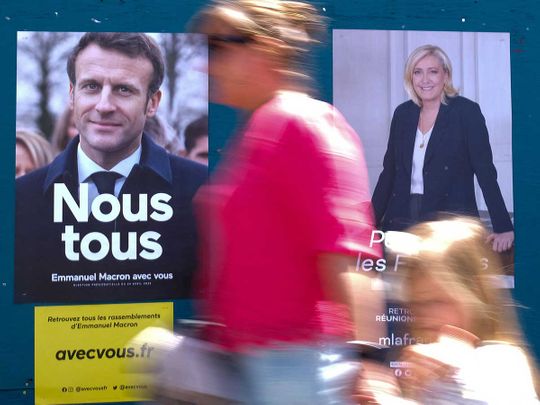
Paris: France votes on Sunday in presidential elections facing a stark choice between centrist President Emmanuel Macron and challenger Marine Le Pen, after a fractious campaign that has seen the French far-right come its closest yet to winning power.
Macron goes into the election with a reasonable lead in polls over Le Pen, an advantage he consolidated in the frenetic final days of campaigning, including a no-holds-barred performance in the pre-election debate.
But analysts have warned Macron, who rose to power in 2017 aged 39 as the country's youngest ever modern leader, can take nothing for granted with turnout crucial to ensuring victory.
He must above all ensure that left-wing voters who backed other candidates in the first round on April 10 hold their noses and back the centrist former investment banker to stop Le Pen winning power.
Polls in mainland France will open at 0600 GMT on Sunday and close 12 hours later, immediately followed by projections that usually predict the result with a degree of accuracy.
Some 48.7 million French are eligible to vote.
To take account of the time difference with mainland France, polls opened earlier in overseas territories, home to almost three million French.
The first vote in the election was cast midday Saturday Paris time by a 90-year-old man in the tiny island territory of Saint Pierre and Miquelon off the northern coast of Canada.
Polls subsequently opened in France's islands in the Caribbean and the South American territory of French Guiana, followed by territories in the Pacific and then Indian Ocean before the mainland joins.
Turnout key
Macron himself repeatedly made clear that the complacency of stay-at-home voters precipitated the shocks of the 2016 polls that led to Brexit in Britain and Donald Trump's election in the United States.
Analysts say abstention rates could reach 26 to 28 percent, although the 1969 record for a second-round abstention rate of 31.1 percent is not expected to be beaten.
Far-left leader Jean-Luc Melenchon, who scored a close third-place finish in the first-round vote on April 10, has pointedly refused to urge his millions of followers to back Macron while insisting they must not cast a single vote for Le Pen.
Another factor is that elections are being held in the midst of the Easter school break in much of France.
According to Martial Foucault, director of the CEVIPOF political studies centre, the greater the abstention rate the more the gap will narrow between Macron and Le Pen, describing this as a "real risk" for the president.
If elected, Macron is expected, in a symbolic gesture, to address supporters on the Champ de Mars in central Paris at the foot of the Eiffel Tower.
Polls have shown Macron with a lead of around 10 percentage points in an outcome much closer than in 2017, when the same candidates faced off.
Macron won then with 66 percent. The other far-right run-off challenge was in 2002 when Chirac crushed Marine Le Pen's father Jean-Marie with over 82 percent of the vote.











